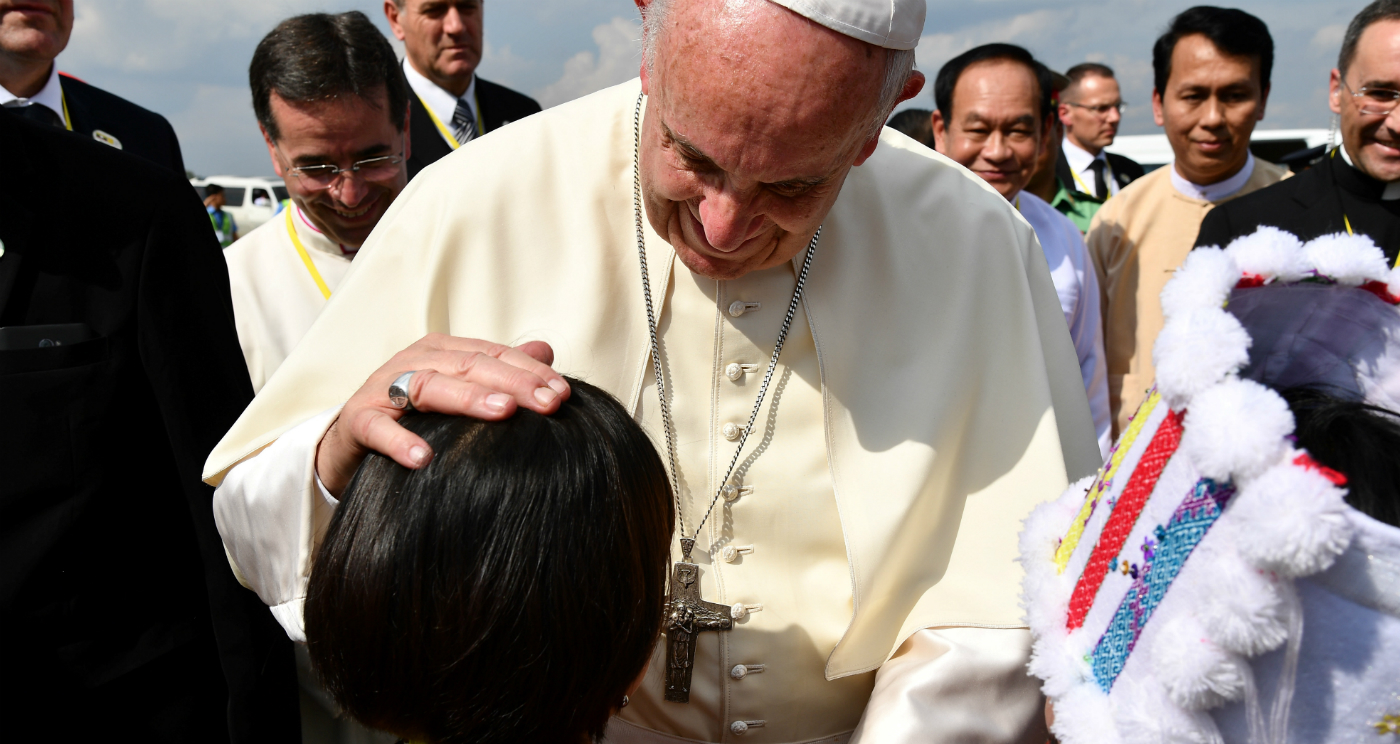Pope Francis begins risky Myanmar peace mission
Pontiff warned not to even say the word “Rohingya”

A free daily email with the biggest news stories of the day – and the best features from TheWeek.com
You are now subscribed
Your newsletter sign-up was successful
Pope Francis is walking a diplomatic tightrope as he embarks on a peace mission in Myanmar today amid claims the country is committing genocide.
An estimated 600,000 Rohingya Muslims have fled from Buddhist-majority Myanmar to neighboring Bangladesh since August following security operations by the Myanmar military. UN human rights official Zeid Ra’ad Al Hussein said in September that the exodus was a “textbook example” of ethnic cleansing.
The Pope was greeted by children at Yangon International Airport, in south Myanmar, ahead of his meetings with the nation’s de facto leader Aung San Suu Kyi and the head of the military. He will also visit Bangladesh to meet a small group of Rohingya refugees there, in a symbolic gesture.
The Week
Escape your echo chamber. Get the facts behind the news, plus analysis from multiple perspectives.

Sign up for The Week's Free Newsletters
From our morning news briefing to a weekly Good News Newsletter, get the best of The Week delivered directly to your inbox.
From our morning news briefing to a weekly Good News Newsletter, get the best of The Week delivered directly to your inbox.
The 80-year-old pontiff “has become known for his moderate views and willingness to denounce global injustice”, the BBC says.
But the situation is so delicate that some papal advisers have warned him not to use the word “Rohingya”, lest he “set off a diplomatic incident that could turn the country’s military and government against [its] minority Christians”, says Reuters.
Aaron Connelly, research fellow at Australia’s Lowy Institute, told CNN that the Pope’s desire to talk about the Rohingya was “clearly the thing that motivated this visit”.
According to Connelly: “The question is ... is he going to do that in a way which is less confrontational and engages? Or is he going to say, this is outrageous, these people have a right to be in Myanmar?”
A free daily email with the biggest news stories of the day – and the best features from TheWeek.com
-
 The Olympic timekeepers keeping the Games on track
The Olympic timekeepers keeping the Games on trackUnder the Radar Swiss watchmaking giant Omega has been at the finish line of every Olympic Games for nearly 100 years
-
 Will increasing tensions with Iran boil over into war?
Will increasing tensions with Iran boil over into war?Today’s Big Question President Donald Trump has recently been threatening the country
-
 Corruption: The spy sheikh and the president
Corruption: The spy sheikh and the presidentFeature Trump is at the center of another scandal
-
 Epstein files topple law CEO, roil UK government
Epstein files topple law CEO, roil UK governmentSpeed Read Peter Mandelson, Britain’s former ambassador to the US, is caught up in the scandal
-
 Iran and US prepare to meet after skirmishes
Iran and US prepare to meet after skirmishesSpeed Read The incident comes amid heightened tensions in the Middle East
-
 Israel retrieves final hostage’s body from Gaza
Israel retrieves final hostage’s body from GazaSpeed Read The 24-year-old police officer was killed during the initial Hamas attack
-
 China’s Xi targets top general in growing purge
China’s Xi targets top general in growing purgeSpeed Read Zhang Youxia is being investigated over ‘grave violations’ of the law
-
 Panama and Canada are negotiating over a crucial copper mine
Panama and Canada are negotiating over a crucial copper mineIn the Spotlight Panama is set to make a final decision on the mine this summer
-
 Why Greenland’s natural resources are nearly impossible to mine
Why Greenland’s natural resources are nearly impossible to mineThe Explainer The country’s natural landscape makes the task extremely difficult
-
 Iran cuts internet as protests escalate
Iran cuts internet as protests escalateSpeed Reada Government buildings across the country have been set on fire
-
 US nabs ‘shadow’ tanker claimed by Russia
US nabs ‘shadow’ tanker claimed by RussiaSpeed Read The ship was one of two vessels seized by the US military